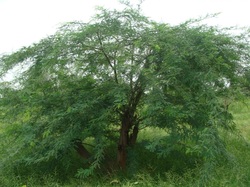
You may be surprised to know that there are trees that can harm the environment. One such tree that is quite popular in South India is babool tree - known as "seemai karuvelam" in Tamil, wherein “seemai” means “foreign”. Babool is an invasive plant - a species that is not native to the ecosystem being considered. Therefore, it can - or likely to - cause harm to environment as well as economy and health of people and animals.
Many global organizations are into creating awareness on the harmful effects of babool: Though, this tree grows in drought-hit areas and can be used as firewood, they extensively exploit ground water and drastically reduce water tables. No other trees can find water. Even if there is no ground water, babool can absorb humidity in the air, and thus prevent the chances of rain fall.
Moreover, the roots of babool can destroy soil nutrients, and poison ground water. Since it does not produce enough oxygen (it produces only carbon dioxide in huge quantities), no birds find a shelter in these trees. Its leaves, seed or any other parts of the tree are of no use to human beings and animals.
Babool trees are common sight in the districts of Ramanathapuram, Sivagangai, Pudukottai, Virudunagar and Theni in Tamil Nadu, because people do not yet know the dangers of these invasive trees. They even plant these trees for firewood. In fact, droughts in these southern districts could be linked to the presence of babool trees.
There are many versions as to how these trees entered several Indian States like Tamil Nadu, but States such as Kerala had not allowed the planting of these trees. In those days, the trees would have been imported for its ability to adapt to drought. However, having known the harmful effects of seemai karuvelam, we should take quick measures to uproot these trees from the soils of Tamil Nadu.
Many global organizations are into creating awareness on the harmful effects of babool: Though, this tree grows in drought-hit areas and can be used as firewood, they extensively exploit ground water and drastically reduce water tables. No other trees can find water. Even if there is no ground water, babool can absorb humidity in the air, and thus prevent the chances of rain fall.
Moreover, the roots of babool can destroy soil nutrients, and poison ground water. Since it does not produce enough oxygen (it produces only carbon dioxide in huge quantities), no birds find a shelter in these trees. Its leaves, seed or any other parts of the tree are of no use to human beings and animals.
Babool trees are common sight in the districts of Ramanathapuram, Sivagangai, Pudukottai, Virudunagar and Theni in Tamil Nadu, because people do not yet know the dangers of these invasive trees. They even plant these trees for firewood. In fact, droughts in these southern districts could be linked to the presence of babool trees.
There are many versions as to how these trees entered several Indian States like Tamil Nadu, but States such as Kerala had not allowed the planting of these trees. In those days, the trees would have been imported for its ability to adapt to drought. However, having known the harmful effects of seemai karuvelam, we should take quick measures to uproot these trees from the soils of Tamil Nadu.


 RSS Feed
RSS Feed
